 Petzlover
Petzlover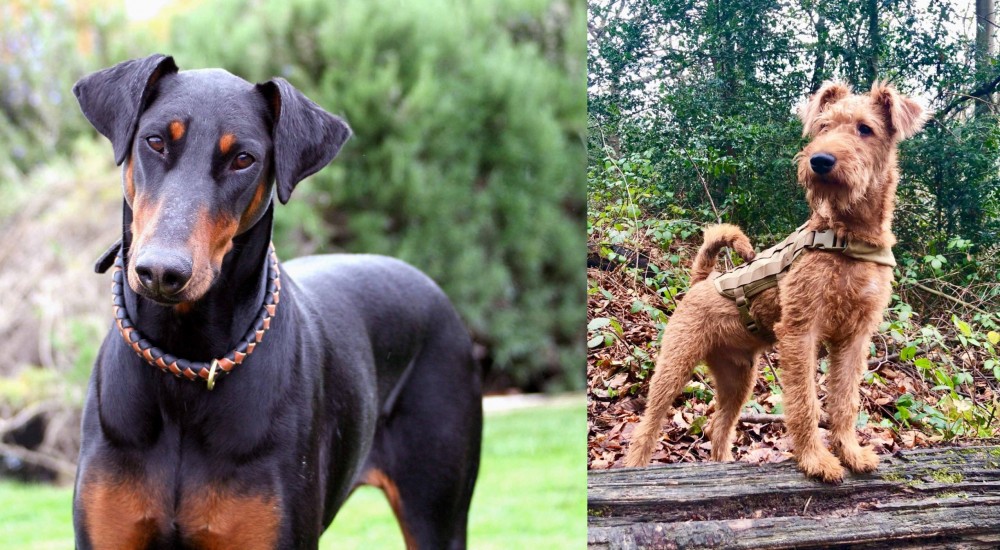 Doberman Pinscher is originated from Germany but Irish Terrier is originated from Ireland. Doberman Pinscher may grow 22 cm / 9 inches higher than Irish Terrier. Doberman Pinscher may weigh 33 kg / 73 pounds more than Irish Terrier. Doberman Pinscher may live 4 years less than Irish Terrier. Doberman Pinscher may have more litter size than Irish Terrier. Doberman Pinscher requires Low Maintenance. But Irish Terrier requires Moderate Maintenance
Doberman Pinscher is originated from Germany but Irish Terrier is originated from Ireland. Doberman Pinscher may grow 22 cm / 9 inches higher than Irish Terrier. Doberman Pinscher may weigh 33 kg / 73 pounds more than Irish Terrier. Doberman Pinscher may live 4 years less than Irish Terrier. Doberman Pinscher may have more litter size than Irish Terrier. Doberman Pinscher requires Low Maintenance. But Irish Terrier requires Moderate Maintenance
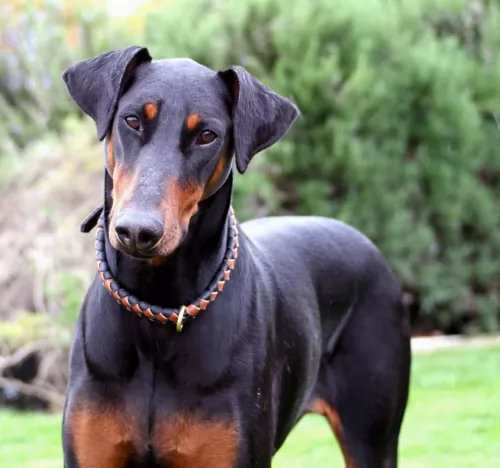 The origin of Doberman is Apolda, in Germany in 1890. It was officially recognized as a breed in 1900. The name originally called as Thuringer pinscher or Plizeilichi and the peer was renamed as DOBERMAN PINSCHER in 1899.American Kennel Club recognized DOBERMAN PINSCHER in 1908. The German tax collector called Karl friedrich developed Doberman.
The origin of Doberman is Apolda, in Germany in 1890. It was officially recognized as a breed in 1900. The name originally called as Thuringer pinscher or Plizeilichi and the peer was renamed as DOBERMAN PINSCHER in 1899.American Kennel Club recognized DOBERMAN PINSCHER in 1908. The German tax collector called Karl friedrich developed Doberman.
He developed a breed that would be able to protect him from his surroundings and from his neighborhoods. This Dober also ran as a local animal shelter and approch many dogs for his breeding program. But karl did not kept any proper records or document for this breeds origin. Dobeis are also found through United States, Russia and South Africa.
 The Irish Terrier is a dog breed from Ireland and one of the many different terrier breeds there are.
The Irish Terrier is a dog breed from Ireland and one of the many different terrier breeds there are.
Nobody is too sure of the Irish Terrier's history but it is one of the oldest terrier breeds. It appears as if the dog breed was developed from a wheat colored terrier and the extinct black and tan terrier.
It was always a common practice to crop the ears of terriers, but in 1889 the Irish Terrier Club required that the ears remain uncropped. The first Irish Terrier was shown in 1881, and the first Irish Terrier registered with the American Kennel Club was in 1885. The Irish Terrier Club of America was founded in 1896.
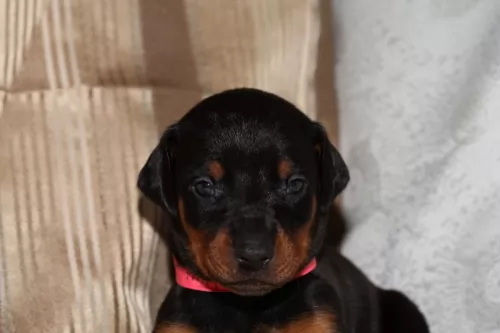 Dobermans are certainly shorthaired mixed –breed shepherd dogs, this kind of dogs are chosen only for their intelligent, sound and endure. This breed is best in attitude and appearance, and now it is found in world wide. Dobermans are highly intelligent and fast runners. So mostly dobers are only suited for Police, Army and Guard works. Dobies are also used as guide dogs for the blind.
Dobermans are certainly shorthaired mixed –breed shepherd dogs, this kind of dogs are chosen only for their intelligent, sound and endure. This breed is best in attitude and appearance, and now it is found in world wide. Dobermans are highly intelligent and fast runners. So mostly dobers are only suited for Police, Army and Guard works. Dobies are also used as guide dogs for the blind.
They are very elegant in appearance. Dobies are watchful, determined, energetic, fearless, obedient, alert and loyal. Dobies are short coat so it is easy for care. Brushing regularly can avoid shedding at home. They have almond shaped eyes, they have long narrow heads. The Doberman ears are often cropped but many of the owners like dobers by their nature. Dobers looking was always like a graceful giant.
 The Irish Terrier is a medium sized dog who stands between 45cm and 50cm and weighs in the region of 11 to 12kg. He has a short, dense, wiry double coat which is a red, golden, sandy, wheaten color.
The Irish Terrier is a medium sized dog who stands between 45cm and 50cm and weighs in the region of 11 to 12kg. He has a short, dense, wiry double coat which is a red, golden, sandy, wheaten color.
The ears of the dog are semi-erect/semi-floppy and the tail is held high and curved.The chest is deep and muscular and the front and back legs are strong, long and muscular.
The Irish Terrier is a companion dog today, even though he was once a guard- and hunting dog. He is an amicable dog while also being alert and active. He is also independent and strong-willed so he will require training and socialization as then he becomes obedient and relaxed and much easier to live with.
They're social dogs too, loving all the members of their human family, getting on well with children in the home.
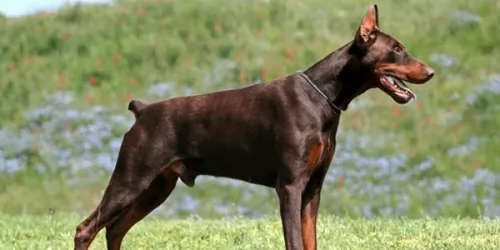 Dobermans are individual in personalities. Some dogs are friendly and outgoing; some Dobies are reserved and shy. Some will be more dominant with other dogs it used to chase small dogs and cats. Most of the dobers are soft in character and love companionship with people.
Dobermans are individual in personalities. Some dogs are friendly and outgoing; some Dobies are reserved and shy. Some will be more dominant with other dogs it used to chase small dogs and cats. Most of the dobers are soft in character and love companionship with people.
Dobers have high energy level and it requires a lot of exercise in order to avoid harmful behavior to others. We should keep them interested because intelligent dogs are easily got bored. They mostly enjoys only in outing because they will be happy with the people who walks, runs and in bike riding.
When learning new things they are the best. Dobermans are not able to be a lazy. For many years dobers are the only dogs being excellent as police dogs. Because they are highly active in nature so they are interested in new this for learning.
Dobers are apartment adaptable dogs. They used to bark but are close and friendly to people. At the same time we have to train dobers to welcome the guest also.
 Irish Terriers are good with people and want to be an active member of their human families.
Irish Terriers are good with people and want to be an active member of their human families.
They are active dogs and will require ongoing mental and physical stimulation. This is a lively dog, but he still loves to spend quiet time indoors with his family.
They’re intelligent dogs with a strong sense of loyalty towards their owner, making excellent family pets.
 The Irish Terrier is a healthy dog breed and you won't find yourself running to the vet often with him, but still he can land up with one of the common dog problems.
The Irish Terrier is a healthy dog breed and you won't find yourself running to the vet often with him, but still he can land up with one of the common dog problems.
It is always wise to be aware of hip dysplasia as this is a disease which can occur in all dog breeds and all dog ages. Also look out for eye diseases such as progressive retinal atrophy and cataracts as these can lead to blindness in your pet.
There is a disease known as cystinuria which is quite a concern with Irish Terriers. It’s an inherited kidney disease where increased amounts of arginine, lysine, amino acids cystine and ornithine are excreted in the urine.
In well-functioning kidneys, blood is filtered so as to create urine. Cystine is reabsorbed back into the bloodstream but with dogs affected with cystinuria they cannot reabsorb cystine back in their bloodstream, causing an accumulation in the urine. Dogs with cystinuria suffer inflammation of the urinary tract and can also develop urinary blockage and kidney failure. Immediate veterinary intervention is required.
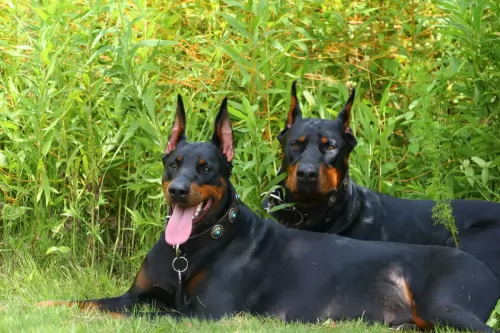 Dobers are mostly come in black, blue, red or fawn. Dobers are low maintenance for grooming. They were clean dogs because they never make a strong dog odor. Using brush in dobers hair for once per week reduces hair fall control. Dobers are not requiring frequent bathing most of the owners are getting bath for 3 or 4 times per year in grooming.
Dobers are mostly come in black, blue, red or fawn. Dobers are low maintenance for grooming. They were clean dogs because they never make a strong dog odor. Using brush in dobers hair for once per week reduces hair fall control. Dobers are not requiring frequent bathing most of the owners are getting bath for 3 or 4 times per year in grooming.
You can feed your puppy 2-3 small meals per day until it was 4 months old. And then have to decrease one meal and two for a day. And often you should not keep food and leave food sitting out all the time. Then after six months needs to stop feeding much vitamins and minerals because it leads a several health problems in his muscle and joints.
This type of dogs should not be tied up alone outside, because it should be manifest itself by barking chewing. The people who are working for a long time should not be adopting this type of dogs. Naturally dobers are well protective to our home and people. At the same time small children must be supervised. At the same time if we are not strict, dobers would be get out of our hand.
 The coat of the Irish Terrier requires a brush twice a week to keep it bright. If you intend showing your dog, the coat will need to be stripped a couple of times a year to maintain the texture and color.
The coat of the Irish Terrier requires a brush twice a week to keep it bright. If you intend showing your dog, the coat will need to be stripped a couple of times a year to maintain the texture and color.
Other Irish Terrier owners take their dog to the groomers to have the coat clipped. The dog doesn't shed a lot and they are referred to as being somewhat hypoallergenic.
As with any other dog breed, other grooming needs with your Irish Terrier will include clipping the nails, checking his teeth for plaque build-up and checking inside the ears for infection.
If you're unsure how to perform these grooming procedures with your pet, simply ask your vet who will explain to you precisely how to ensure your dog remains in tip top condition.
He's a fairly active dog so you want to make sure that you are attending to his exercise needs. Take him for a walk every day, and if you've got a good sized garden, throw a ball for him. If you're a jogger you can count him in.
What you feed your Irish Terrier will depend a lot on his age and his activity levels. Every dog is a unique individual and nothing is set in stone regarding their diets. Just like people though, feeding him a lot of junk food will contribute to illness and shorten his lifespan.
He needs quality food. If you buy commercially manufactured food, make sure to read up on how much to feed him. Try and mix in some cooked chicken, brown rice and vegetables from time to time as well as some raw meat.
Learn to know what foods are toxic for him. Make sure he has a bowl of fresh, cool water constantly available to him.